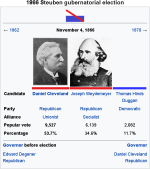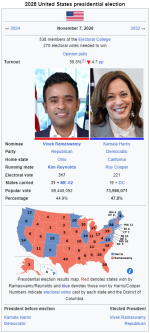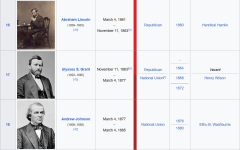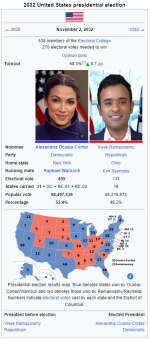BigVic_1994
New member
How do you use inspect element to make it?
I just mix and match elements from different infoboxes. I usually pre-crop the images courtesy of either Snipping Tool or the photo editing program I use (typically Ibis Paint X) then upload them to imgbb.com or postimg.cc so I can Inspect Element them into the actual photos themselves.How do you use inspect element to make it?
Is there a guide to making a wikibox?


View attachment 83092
2024, as seen in We Shall Overcome (now revised with the actual images Wikipedia's using.)





Did NE/ME went to WTA?View attachment 83156
2028, as seen in We Shall Overcome; the Trumpist wing of the GOP coalesces around Vivek Ramaswamy (how he'd accomplish this I am still trying to figure out), and Ramaswamy exploits Harris' nationwide unpopularity in the wake of the Fourth Taiwan Strait Crisis to achieve what is essentially a delayed Trump 2024.
IIRC, Ramaswamy's unpopular in ME-02, but NE-02 goes red by a narrow margin.Did NE/ME went to WTA?
We have rebelled against all controls and religions, all laws and judgments which the mighty sought to foist upon us. We kept to our dedication and our missions. By these will the State be judged, by the moral character it imparts to its citizens, by the human values determining its inner and outward relations, and by its fidelity, in thought and act, to the supreme behest: "and thou shalt love thy neighbor as thyself."
-David Ben-Gurion
Israel in a Three-Way Cold War (1945-1975):
After WWII, and even after Nakam poisoned the water supply of Bavaria, the post WWII calls for the establishment of a Jewish state would be loud, and lead to the formation of Israel in 1948. All three major powers and blocs enthusiastically backed Israel's formation at the beginning. The western Anglo-American bloc saw broad support for Israel, with both the left-liberal Henry Wallace and archconservative Winston Churchill being major supporters. Indeed, Wallace's loyalty (and his opponent Eisenhower's lack of enthusiasm for the state), would lead to Wallace winning the Jewish bloc easily, even as he was destroyed nationally. Soviets, who had long opposed Zionism, soon came to support Israel, with Stalin, despite his personal antisemitism, recognizing the state in 1948. Possibly the most enthusiastic of the three powers were the Japanese. Koreshige Inuzuka, who became Japan's Minister of Overseas Affairs, had read the famed antisemitic Protocols of the Elders of Zion, and instead of becoming antisemitic as a result, viewed the Jews as powerful, and good allies for the Japanese Empire. As such, the Japanese Empire had major support for Japan, and would recognize the nation in 1948 as well.
Israel's independence in 1948 led to the First Arab-Israeli War shortly after independence, as the Arab League opposed Israel's formation, calling for an independent Palestine (while blocking the formation of a Palestinian government). While the Arab League expected an easy victory over the Israeli state, Israel would prevail, beginning the Nakba, where 700,000 Palestinians were either expelled or fled Israel. Alongside the Nakba came the mass expulsion of Jews from Arab nations (declared the "Jewish Nakba" by later sources[1]). As a result of this, and an exodus of Holocaust survivors, people fleeing the post-Nakam pogroms of 1946-48, and the Beria government allowing thousands of Jews to leave the Soviet Union after pogroms began in Georgia following allegations of "Jewish influence" in Stalin's death[2], the population of the state of Israel would increase to around 2.8 million[3] by 1960.
Israel-United States relations would deteriorate as Henry Wallace left power and the nation continued to grow. The Free Officers Coup in 1952 was welcomed by the United States, and as Eisenhower won a crushing re-election against the Liberals, dying Democratic party, and "Constitution Party", he was planning a Middle Eastern Defense Organization with Egypt's new leader, Gamal Nasser, although Nasser was less enthusiastic about the decision, and the Organization would fail. Indeed, when the Suez Crisis, a conflict between Anglo-Israeli forces and Nasser's Egypt broke out, Eisenhower remained neutral, angering the British and Israelis. Israel would end up occupying the Sinai Peninsula as a result of the conflict, further causing conflicts with the US.
While Eisenhower maintained a policy of trying to win over both Arabs and Israelis - based on the mistaken opinion that both sides would put aside their differences to oppose communism - his successors would become much more hostile. Israel's occupation of the Sinai would lead to Eisenhower's successor, Jack Cox, sanctioning the small nation for its occupation of Sinai[4], although said occupation would end shortly into Cox's term in 1957. The United States' growing hostility and hope of forming alliances with Nasser and other Arab regimes, especially in the face of France's "semi-neutralist" stance on the Cold War[5] after the Soviet Union promised to withdraw support for the Algerian FLN, would put Israel in a strange place. Still broadly supported by the UK, Japan, and Soviet Union, American hostility would push them further and further into support from the Soviets. In 1965, under the presidency of George Lincoln Rockwell, things would finally come ahead, with the United States and Israel conflicting over the Israel nuclear plan. Rockwell would continue to come into conflict with David Ben-Gurion over the program, which would lead to a divide in relations. When Israel would end up buying weapons from the Soviet regime, which would lead to a brief break in the Anglo-American alliance, as Rockwell would sanction the Israelis.
Soviet support for Israel would eventually lead to Eisenhower's plans for a Middle Eastern Defense Organization coming true. Nasser, along with his new allies in Syria and Jordan, would align with several other nations, largely helped by Rockwell's anger at the Israeli state. In 1967, a year after the MEDO was forged, Israel would invade the Sinai, and with Soviet and Japanese support, would retake the Peninsula and the Golan Heights. The war began the final break with the English, who were repelled by Israel's allegiance with the Soviets.
In 1968, political reform would begin in the country, as David Ben-Gurion, now split off from his Mapai party, would form the Rafi party, which soon replaced Mapai as the leading left-wing party in Israel. The party, led by Gideon Ben-Yisrael, would win the 1969 elections, promising to fix the electoral system of Israel, and would shift it towards first-past-the-post. Yisrael's premiership would see even closer ties with the Soviets, and Israel's growing influence in sub-Saharan Africa. In the Nigerian Civil War, they backed the breakaway Biafrans, in Kenya, Rhodesia, and South Africa they backed African revolutionaries, and in the Sudanese Civil War, a war which saw Israel align with Patrice Lumumba's Congo, Ethiopia, France, Japan, and Spain against the Communist-led Sudan backed by the Soviets and United Kingdom, they sent troops led by David Ben-Uziel.
With Al Gore I's election in 1972, Israel hoped for an improved relationship with America, hoping to once more gain support from all three major powers. However, while Gore visited the Congo and broke bread with Lumumba and forged the Euro-American Trade Community, he all but maintained Rockwell's stance on the state, and continued to heavily support Nasser. As such, Israel has only further joined the Soviet bloc, and its leadership has since been targeted by the CIA, culminating in the assassination of Moshe Dayan in 1974.
[1] OTL
[2] Based on the "Doctors Plot" allegations and 1956 Georgia Uprising
[3] Slight increase from OTL - notably the population stays much more European due to Nakam, causing Labor Zionism to stay in vogue for longer - although that's a change that effects a later period than this is covering.
[4] https://www.jta.org/archive/eisenhower-reveals-his-1957-aims-to-penalize-israel-on-sinai-issue
[5] https://en.wikipedia.org/wiki/Suez_Crisis#Canal_nationalisation
Given he barely scratched 5% IRL. How did you imagine he did so much better ?What if Nicolas Dupont-Aignan was elected President of France in 2017? (Both maps are larger than 1 megabyte)
View attachment 83170
View attachment 83171
If everything was completely realistic, there would be no alternate history, because most of the time, the most realistic thing happened. Since this is counterfactual, and Dupont-Aignan is a real politician, it doesn't need an answer.Given he barely scratched 5% IRL. How did you imagine he did so much better ?
If everything was completely realistic, there would be no alternate history, because most of the time, the most realistic thing happened. Since this is counterfactual, and Dupont-Aignan is a real politician, it doesn't need an answer.
I imagined him doing better in 2012 or reacting strongly to the 2015 terrorist attacks, but yes, there was no reasoning – I just had the idea of him winning in 2017, regardless of how realistic it is, and put it in practice.Yeah but usually there is reasoning behind a scenario or what lead for something to play out differently. For example if Macron hadn't run would the Republicans have pulled it together enough to beat Melenchon and Le Pen or what if the Socialists had had a different candidate.
I wondered if there was reasoning behind you coming up with this result. What events lead to him winning. Otherwise it's just names and numbers. IMO anyway.
I imagined him doing better in 2012 or reacting strongly to the 2015 terrorist attacks, but yes, there was no reasoning – I just had the idea of him winning in 2017, regardless of how realistic it is, and put it in practice.
They did almost as well in 2017 as LREM did IOTL, and yes, DLF replaced FN as the default far-right party.So does he supplant the NR as the party of the hard right then? Based on a lack of Le Pen.
(Also I thought you'd significantly lowered the Socialist result. Forgot quite how badly they did in 2022)
Any thoughts on he'd then govern without a majority in the Assembly? Or does DLF do well there in 2017 too as LREM did IOTL (although with different voting bases. At least in 2017)
